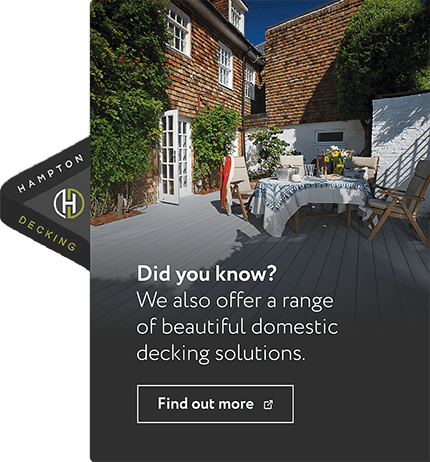Decking has become an integral part of many homes and holiday properties, offering a seamless transition between the indoors and the great outdoors. When it comes to choosing the right decking material, two options often come to the forefront: Composite and uPVC. Both have their merits, but which one is truly the best fit for your needs? Let’s delve into the details and find out.
Understanding the Basics
Before we dive into the comparison, it’s essential to understand what each material is and its primary characteristics.
uPVC Decking
uPVC, or unplasticised polyvinyl chloride, is a type of plastic that’s known for its durability and low maintenance. Here at Mayfield Decking, we’re a leading UK supplier with over 30 years of experience and we specialise in uPVC decking. Our uPVC Hampton decking is particularly popular for static caravan decking due to its advanced technology and minimal upkeep.
Composite Decking
Composite decking is made from a blend of wood fibres and plastic. It combines the natural look of wood with the resilience of plastic, making it a sought-after choice for many homeowners.
Comparing the Two: Pros and Cons
To make an informed decision, it’s crucial to weigh the advantages and disadvantages of both materials.
uPVC Decking: The Advantages
- Durability: uPVC is known for its strength. It can withstand various weather conditions, making it a long-lasting choice.
- Low Maintenance: Unlike traditional wood, uPVC doesn’t require regular staining or sealing. A simple wash now and then is enough to keep it looking fresh.
- Eco-friendly: Mayfield Decking emphasises the use of 100% recyclable materials, making our uPVC decking an environmentally conscious choice.
Composite Decking: The Advantages
- Natural Appearance: Composite decking offers the beauty of wood without the associated maintenance.
- Stain and Fade Resistant: It’s designed to resist staining and fading, ensuring a vibrant look for years.
- Versatility: Available in various colours and finishes, composite decking can be tailored to suit any aesthetic.
uPVC Decking: The Disadvantages
- Aesthetic Limitations: While uPVC decking is durable and low-maintenance, it may not offer the same natural look that some homeowners desire.
- Flexibility: uPVC decking can sometimes flex under heavy weight, which might be a concern in areas with significant foot traffic.
- Heat Retention: uPVC can retain heat, especially in darker colours. This can make the decking uncomfortable to walk on barefoot during particularly hot summer days.
Composite Decking: The Disadvantages
-
- Cost: Composite decking often comes with a higher initial cost compared to other decking materials, including uPVC.
- Potential for Scratches: While it’s designed to be durable, composite decking can be prone to scratches, which might be challenging to repair.
- Weight: Composite decking is generally heavier than uPVC, which might require a more robust support structure and more work while installing.
- Fades over time: While designed to resist fading, composite decking can still lose some of its colour over time, especially when in direct sunlight.
- Heat Retention: Composite decking can become hot under direct sunlight, making it uncomfortable to walk on during sunny days.
Making an Informed Decision
Both uPVC and composite decking have their pros and cons. While uPVC from trusted suppliers like Mayfield Decking offers durability and eco-friendliness, composite decking does bring a natural appearance and versatility. It’s essential to consider both the advantages and disadvantages above to make a choice that aligns with your preferences, needs, and budget.
Further Points to Consider
- Cost: While initial costs might vary, consider the long-term expenses associated with maintenance and potential replacements. Also keep in mind how much you plan to use your decking.
- Environmental Impact: If being eco-conscious is a priority, delve deeper into the manufacturing processes and recyclability of the materials.
Making the Right Choice for Your Needs
Your choice between uPVC and composite decking should align with your specific requirements. If you prioritise durability and minimal maintenance, uPVC decking from specialists like Mayfield Decking might be the way to go. On the other hand, if you’re prioritising a more natural appearance, composite decking could be your best bet.
Conclusion: A Deck for Every Dream
Whether you opt for the robustness of uPVC or the aesthetic appeal of composite, remember that the right decking can transform your outdoor space. With companies like Mayfield Decking offering a range of quality decking and accessories, you’re sure to find a solution that resonates with your vision.
Looking to explore more about our decking options? Dive into the world of Mayfield Decking and discover a plethora of choices tailored to your needs. From lighting to balustrades, we’ve got you covered. Find out more on our homepage.
FAQs
Q: What are the benefits of choosing uPVC for decking?
A: uPVC decking is low maintenance, durable against the elements, and does not warp or rot. It’s an excellent choice for a long-lasting outdoor space.
Q: Why is PVC decking becoming popular in the UK?
A: In the UK, PVC decking is gaining popularity for its durability, low maintenance requirements, and resistance to weather, making it ideal for the varied British climate.
Q: What advantages do uPVC balustrades offer for decks and balconies?
A: uPVC balustrades provide safety, are easy to install, and come in various styles to complement your outdoor area. They are resistant to weather and require minimal upkeep.


